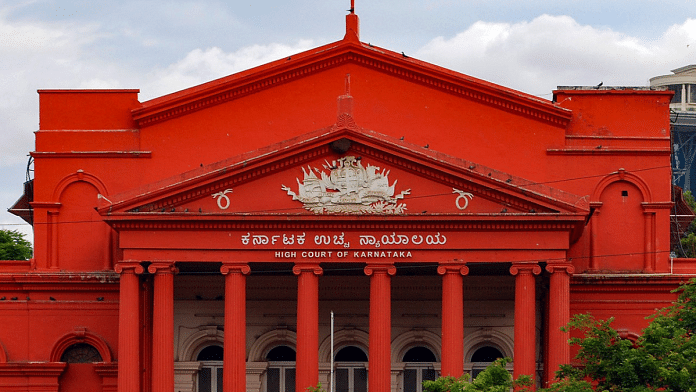New Delhi: “All love begins and ends with motherhood, by which a woman plays God,” the Karnataka High Court (HC) observed last week, as it directed the State Surrogacy Board to consider the surrogacy plea of a Bengaluru couple where the woman had got her uterus surgically removed and the man was aged 57.
Under the Surrogacy (Regulation) Act, 2021, surrogacy is only permissible when the intending father and mother are a maximum of 55 years old and 50 years old, respectively.
In the case under consideration of Justice M. Nagaprasanna, the intending father (surrogate father) was 57 years old, while the woman was 45 years old.
In their application, the intending couple had stated that they were a happy family with a son, an MBBS graduate, until he passed away in a car accident aged 23. On his death, the couple went into acute depression. They initially considered adopting a child, but were advised to go for surrogacy.
Being a close-knit family, the woman’s sister then came ahead to donate the egg while a 25-year-old family friend and mother of two children agreed to bear the child.
However, because of the man’s age, they were not permitted to take the surrogacy route under legal provisions.
The couple then approached the Karnataka High Court with the plea to allow the surrogacy as an exceptional circumstance, which it has now done.
For considering such exceptional cases in the future, Justice Nagaprasanna also put forth a “triple test” which would act as a guideline. The test requires the State Surrogacy Board to consider the “genetic, physical and economical” criteria of a couple while deciding cases of surrogacy.
The HC decision comes in the wake of the Supreme Court considering the constitutionality of the Surrogacy Act, wherein it had said that “amendments” were needed to make the Act more workable.
Also Read: ‘Bhade ki kokh’ — how traffickers from North Bengal earn lakhs from illegal surrogacy
Triple test
Justice Nagaprasanna noted that the three tests proposed to ascertain whether a couple were fit for surrogacy — genetic, physical, and economic — were already available in the public domain.
According to the court, with an increase in age, there is a likely deterioration in sperm health. To ensure that there is a healthy birth, a genetic test to check the health of the sperm of the intending father is required.
“Since the petitioner is now aged 57 years, it would become necessary for him to undergo the genetic test for determination of the health of the sperm, so that the child born out of the embryo of which the sperm of the petitioner is an impregnable part, is not born with any disorder or infirm,” it observed.
Moreover, the couple must have the “physical capacity” to take care of an infant. The court clarified that the capacity to carry the child everywhere is not required, but ability to manage the child is a prerequisite.
Lastly, the intending couple must be “economically sound” and must not lead the infant into poverty the moment it is born, the court said. “The procedure and the nuances of seeking such economic tests is best left open to the board/appropriate authority to decide, but such economic test is imperative,” it added.
‘Ironing out creases in law’
The petitioners had challenged the constitutional validity of Section 2 (1) (zg) and Section 4 (iii) (c) (I) of the Surrogacy Act.
Section 2 (1) (zg) of the Act defines a “surrogate mother” as a woman who agrees to bear a child which would be genetically related to the intending couple. On the other hand, Section 4 (iii) (c) (I) mandates that the intending couple should be married and must not have crossed 50 and 55 years of age, respectively.
The court rejected the petitioner’s contention that there was no logical basis for a “cut off” age which has been provided under the Act. However, in the present case, the court felt it must “salvage” the situation and iron out the creases in the legislation.
“Ironing out the creases by the constitutional courts of the provisions of law as promulgated without disturbing the content of the statute is permitted exercise of judicial review, as the lawmakers at the time of making the law would not have envisaged a situation of the kind that is generated in the case at hand,” the court observed.
The way forward
According to the HC, the legislature must look at amendments to the law as it does not leave any discretion to the Surrogacy Board to salvage any unique situation.
It noted that the legislature, while making a law, does not contemplate every possible eventuality from the legislation. “It is those legislative silences that generate relief of the kind that is sought to be granted in the case at hand,” the judge said.
The HC also raised questions over the requirement of the surrogate mother being genetically related to the intending couple. “That defeats both altruism and logic,” Justice Nagaprasanna observed.
He noted that since the constitutionality of the Act was pending before the Supreme Court, striking down of a section was “unavailable”. However, the judge directed the State Surrogacy Board to expedite the couple’s application considering the father’s increasing age.
(Akshat Jain is a student at the National Law University, Delhi, and an intern with ThePrint)
(Edited by Nida Fatima Siddiqui)



